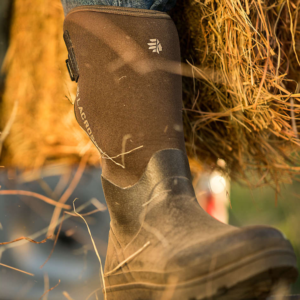443: Jason Johns on Growing Tomatoes
Growing delicious produce – in the garden, an allotment or in the greenhouse!
 Jason is the author of Growing Tomatoes: Your Guide to Growing Delicious Tomatoes at Home, as well as 17 other self-published gardening books on everything from greenhouse gardening to growing giant pumpkins.
Jason is the author of Growing Tomatoes: Your Guide to Growing Delicious Tomatoes at Home, as well as 17 other self-published gardening books on everything from greenhouse gardening to growing giant pumpkins.
Jason is passionate about gardening, having grown his own produce for over twenty years. He started with a second-hand greenhouse, an 8’ by 6’ patch of his mother’s garden, and far too many tomato plants. After turning the greenhouse into a tomato farm, he was hooked at the taste of the first ripe tomato.Don’t miss an episode! Click here to sign up for podcast updates
In This Podcast:
Jason Johns is the author of 18 books on gardening. Here, he shares everything anybody needs to know about growing tomatoes! From the ideal soil, varieties, conditions, and pruning you’ll be ready to plant amazing tomatoes. We also discussed common pests and what to do about them, as well as his first failure with tomatoes and what he learned from the experience. Jason plants something new each year. As a bonus, he also shared some of his other growing experiences!
Listen in and learn about:
-
- Finding your passion and identifying what job serves you
- Some of the first vegetables that Jason grew and what he learned
- The inspiration for some of the 18 gardening books he wrote
- Companion planting
- Growing something new every year
- Tomato growing and why he loves them
- The ideal soil for growing tomatoes
- All the different tomatoes you can grow and which to pick for your garden
- The best conditions for tomatoes to thrive
- How deep to plant tomatoes, what to do with side shoots, and how to focus their energy on the fruit
- Common pests that love tomato plants, and what to do about them
- Tomato blight and how to identify it
As well as:
His failure – His first experience with tomato plants had a small fruit yield because he didn’t know one of the important steps in growing them.
His success – Turning his small allotment into a thriving garden.
His drive – Being mindful and in the moment with nature and sharing his crops.
His advice – Give it a go, failure is feedback on how to do it right. Enjoy the process, and know results are not instant.
Jason’s Guest Post on our blog
How to Grow Tomatoes from Side Shoots – Available on May 6th
Books Written by Jason

Growing Tomatoes: Your Guide to Growing Delicious Tomatoes at Home
Jason’s Book recommendations:
Unlimited Power : The New Science Of Personal Achievement by Anthony Robbins
How to reach Jason:
Website: gardeningwithjason.com, owninganallotment.com
Instagram: allotmentowner
Twitter: allotmentowner
YouTube: Owning An Allotment
Special Sweepstakes Offer:
This contest is closed. We say “Thank You” to Jason and BookPubCo Publishing for this offer.
UrbanFarm.org/growingtomatoes
Thank you to LaCrosse Boots for sponsoring this episode

LaCrosse Boots – The go-to boots for big tasks!
Note: You can also find these books mentioned above at one of our favorite local independent bookstores and have the satisfaction of knowing you are supporting a small business.

Don’t miss an episode! Click here to sign up for podcast updates
*Disclosure:
Some of the links in our podcast show notes and blog posts are affiliate links and if you go through them to make a purchase, we will earn a nominal commission at no cost to you. We offer links to items recommended by our podcast guests and guest writers as a service to our audience and these items are not selected because of the commission we receive from your purchases. We know the decision is yours, and whether you decide to buy something is completely up to you.





Hi I’d love to read Jason ‘s book!
Erica, We’d love to enter you in the giveaway. Please send us an email to podcast@urbanfarm.org with the proper subject line mentioned in the podcast. Alternate entry instructions can be found in the Sweepstakes Rules.
I am concerned about the flea beetle sticky traps. I tried that this last summer and was disheartened to find that bees were stuck on them too. My flea beetles are totally out of control and loosing hope on ever making them go away. Takes 1/2 the summer to get anything big enough to out grow what the flea beetles eat. Thank you for any input you might have.
Jacqueline – please check out Jason John’s reply to your question.
Hi Jacqueline,
Thanks for your question. Flea beetles are a bit of a nightmare, particularly when they get established. There are up to two generations of flea beetle each year and with this particular pest, prevention is much easier than a cure. Typically, by the end of summer, the beetles have stopped eating your plants and autumn crops suffer from much less damage. Unfortunately, many ‘cures’ for pests affect all insects and not just those you want to get rid of and it’s great that you want to protect the bees!
However, that is not necessarily the answer, so what can you do? Firstly, the adults emerge in the spring and start damaging seedlings. They overwinter in leaf debris on the ground. Removing all plant debris from the soil will help to reduce the numbers of this pest. Hoe the soil a couple of times in the autumn and then again in spring as this will bring the larvae to the surface where birds will eat them. Encouraging predators such as birds, frogs and predatory ground beetles into your garden will also help to reduce the numbers.
The pest prevention is to net your plants with an insect proof mesh. Scaffolding netting tends to work quite well and is affordable or any netting with a very tight weave (net curtains are good and often found second hand). These should be well secured to the ground (weigh them down with bricks or wood) so that the beetles cannot get underneath them.
Another way of reducing damage is to start your seedlings off in pots under cover (greenhouse/polytunnel) and plant them out when they are larger. Feeding your seedlings with a high nitrogen feed can help them outgrow the flea beetles so that the pests cause less damage as they prefer seedlings.
A thick layer of mulch around your plants will help prevent the larvae from growing into adults that emerge from the soil. A good, natural way to kill flea beetles is to use diatomaceous earth as this will kill them, but it can damage other insects too. It will also need applying regularly, particularly after it has rained. A chemical agent containing spinosad or permethrin can kill flea beetles, but again, it will damage all insect life. Neem oil is another good, natural treatment, but avoid spraying beneficial insects with it.
The best method is early season control by hoeing the soil several times before planting and encouraging natural predators into your garden. By removing plant debris and preventing weeds from growing, you can starve the larva and prevent them from maturing.
It might take a couple of seasons to get this pest under control, but it can be done naturally and without causing the bees any harm. Frogs can be encouraged into your garden with a pond, birds will come if you put bird feeders out and beetles can be encouraged with piles of logs or a beetle mound.
Hope that helps, but please feel free to ask anything else.